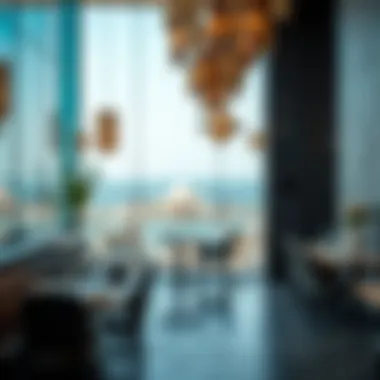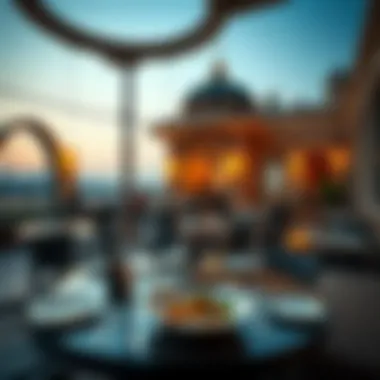Discovering Authentic Turkish Cuisine in Dubai


Intro
In the heart of Dubai, a culinary journey unfolds, woven tightly with the diverse flavors of Turkey. As the city continues to evolve, its culinary scene reflects an impressive mix of cultures and traditions. Turkish food, in particular, has carved a niche for itself—not just as a dining option, but as a testament to the bonds of fellowship and culinary artistry.
Through the bustling streets and luxurious malls, one can discover an array of Turkish restaurants that promise both authenticity and modern twists on timeless dishes. Be it the sizzling sound of kebabs grilling on an open flame or the sweet aroma of baklava freshly prepared with a sticky honey glaze, the experience is tantalizing.
This exploration into the Turkish culinary domain in Dubai goes beyond just listing restaurants. It delves deep into the unique dishes, the historical roots that shaped them, and the many influences that have come to affect how Turkish food is enjoyed in this cosmopolitan city.
So sit back as we embark on this savory adventure—one that highlights local favorites, contemporary adaptations, and cultural intricacies that blend seamlessly with Dubai's vibrant gastronomic fabric.
Preamble to Turkish Cuisine in Dubai
Turkish cuisine has established itself as a significant part of the multicultural culinary landscape of Dubai. With its rich flavors, diverse ingredients, and centuries-old traditions, it stands out not just as a meal but as an experience that tells stories of heritage and innovation. Whether you are a seasoned food enthusiast or a curious newcomer, understanding Turkish cuisine in Dubai offers valuable insights into cultural fusion and gastronomic artistry.
Historical Overview of Turkish Food
The roots of Turkish food date back to the diverse cultures that have inhabited the Anatolian peninsula, influenced by Ottoman heritage, road trades, and neighboring regions. Each historical era contributed unique elements, making Turkish cuisine a rich mosaic of flavors. The Ottomans, for instance, regarded food as an art form, leading to day-long feasts characterized by intricate dishes. Elements such as the use of fresh herbs, spices, and skillful techniques are hallmarks that trace back to these historical practices.
One cannot underestimate how this history flows into contemporary Dubai, where modern chefs occasionally use these traditional recipes but with a twist. For instance, the age-old method of slow-cooking meat often finds itself blended with a contemporary sous-vide technique in some of the more innovative kitchens across the city, creating a dialogue between yesteryears and today's palate.
The Influence of Turkish Culture in Dubai
Dubai serves as a melting pot for cultures from around the globe, and Turkish culture plays a significant role in shaping its culinary narrative. The influx of Turkish expatriates has enriched the local food scene, leading to a growing appreciation for the deeper layers of Turkish gastronomy. From bustling bazaars selling spices to upscale restaurants offering both authenticity and modern embellishments, the Turkish culinary influence is palpable.
In this environment, one can observe a unique synergy where traditional practices encounter contemporary expectations. Turkish tea and coffee have gained popularity and find their way into social gatherings, while dishes like kebabs and baklava have evolved into local favorites. Notably, the concept of shared dining, inherent in Turkish culture, finds resonance in Dubai's vibrant social dining atmosphere. This cultural exchange brings richer complexity, suggesting that Turkish cuisine in Dubai is not just about food but about the shared experiences around it.
"Culinary traditions are often the heartbeats of culture—each bite is imbued with history, values, and community."
Through this central theme of culture and history, the exploration of Turkish cuisine in Dubai sheds light on how food transcends mere sustenance and becomes a medium for connection and celebration.
Culinary Staples of Turkish Cuisine
Turkish cuisine boasts a rich heritage that is deeply intertwined with the cultural identity of the nation. As one explores this vibrant culinary landscape within Dubai, the importance of understanding the staples of Turkish food becomes evident. From kebabs to meze, these dishes not only satisfy the palate but also serve as a window into Turkey's storied past and regional diversity.
The staples of Turkish cuisine offer a glimpse into the resourcefulness of the Turkish people, as they have crafted meals that reflect a blend of influences from the Mediterranean, the Middle East, and Central Asia. Each element of these culinary staples holds significance, whether it is a staple protein, a vital herb, or an accompanying flavor enhancer. In the context of Dubai, where diverse cultures converge, the appeal of Turkish cuisine resonates well, allowing for a unique fusion and innovation in preparation.
Exploring Kebabs and Grilled Meats
Kebabs are perhaps the crown jewel of Turkish cuisine, and their flavor profile showcases the essence of grilling culture. Originating from various regions of Turkey, these skewered meats are marinated in aromatic spices, and grilled to perfection. In Dubai, one can find variations like Adana kebab, which comes from the southern city of Adana, known for its spicy minced meat, or the more traditional shish kebab, which features chunks of tender lamb or chicken.
Each bite provides a smoky savoriness that reflects the grilling methods passed down through generations. The incorporation of fresh herbs like parsley and mint not only heightens their taste but also embodies the freshness of ingredients that constitute the heart of Turkish cooking. Whether one is dining in an upscale restaurant or a cozy hole-in-the-wall, experiencing grilled meats is a pivotal part of Turkish culinary culture.
The Role of Meze in Turkish Dining
Meze is a crucial component of Turkish dining culture, serving as a reminder of the communal aspect of meals in Turkey. Typically, meze consists of small plates filled with various appetizers ranging from stuffed grape leaves to creamy hummus and eggplant dip. These shareable dishes promote social interaction, allowing diners to sample multiple flavors and textures with every meal.


In the melting pot of Dubai, the meze selection often includes modern twists, such as avocado-based dips or fusion ingredients, all while retaining essential characteristics of tradition. This highlights the adaptability of Turkish food in a global context. Guests can expect an explosion of colors on the table, as each dish reflects not merely the taste but also the craftsmanship behind Turkish culinary practices.
Delving into Pide and Other Breads
No exploration of Turkish cuisine is complete without acknowledging the role of bread, particularly pide. Often referred to as Turkish pizza, pide is a boat-shaped flatbread topped with various ingredients ranging from minced meat to cheese. Each region has its take on this famous dish; for instance, the Kayseri pide is known for its peppery ground beef topping while the cheese pide showcases the rich dairy heritage of the region.
In Dubai, many Turkish restaurants focus on the freshness of their breads, often baking them in traditional ovens, which enhances the overall flavor. Bread in Turkish culture acts not just as a side dish but as an integral part of the meal, meant for soaking up sauces and dips, binding families and friends together through shared experiences around the dining table.
In summary, the culinary staples of Turkish cuisine, namely kebabs, meze, and breads like pide, lay the foundation for a rich dining experience in Dubai. These elements are not only indulgent but also foster connections within the diverse fabric of the city, marking Turkish cuisine as an enticing choice for both residents and visitors alike.
Top Turkish Restaurants in Dubai
Dubai’s culinary world is like a colorful mosaic, brimming with influences from across the globe. Among the gems in this mosaic lies Turkish cuisine, known for its robust flavors and rich traditions. The topic of Top Turkish Restaurants in Dubai is not just about where to eat; it’s a reflection of how this cuisine blends the old with the new, offering a plethora of tastes that cater to diverse palates. This article aims to guide food enthusiasts and casual diners alike through the labyrinth of Turkish eateries in Dubai, showcasing establishments that embrace authenticity while innovating their menus to resonate with contemporary tastes.
A Comprehensive Guide to Notable Establishments
In Dubai, the Turkish dining scene is extensive. From casual spots that remind you of kitchen tables in Turkey to upscale restaurants that might not be a far cry from fine dining, there’s no shortage of options. Each establishment tells a story and presents its own take on the cuisine.
Noteworthy Turkish restaurants in Dubai include:
- Zahrat Lebnan: Known for its meze and grilled dishes, this restaurant captures the essence of home-cooked Turkish meals, serving them in a cozy setting that feels welcoming.
- Köşem: If you’re after a more sophisticated experience, Köşem is famed for its elegant ambiance and fine dining touch, where dishes are crafted meticulously.
- Beyrouth: This is where the streets of Istanbul meet modern Dubai. Beyrouth is celebrated for its vibrant atmosphere and a menu that offers everything from kebabs to sweet baklava.
- Saray Muhallebicisi: This isn't just a restaurant; it’s a haven for desserts. Their sadık baklava and künefe make for a sweet ending that keeps patrons coming back, time and again.
Not only do these restaurants serve authentic Turkish dishes, but they also boast unique characteristics that set them apart. For instance, Zahrat Lebnan has a backdrop that reminds diners of sunlit streets of Istanbul, while Köşem incorporates modern elegance.
"Eating in these restaurants is about more than just food; it’s an adventure that transports you to Turkey with each bite."
Innovative Menus and Signature Dishes
Turkish cuisine is rich in regional diversity, offering a variety of ingredients and cooking techniques. In Dubai, many restaurants are not just content with replicating traditional recipes. They are pushing boundaries, creating dishes that are not only appealing to the eye but also palatable for international guests.
Innovative dishes worth trying include:
- Lavash Wraps with a Twist: These aren’t your average wraps; they incorporate global flavors, like spicy harissa chicken or avocado and labneh, creating a fusion that speaks to the melting pot that is Dubai.
- Signature Kebabs: While everyone loves a good şiş kebab, here in Dubai, you can find gourmet styles marinated with pomegranate molasses or saffron, elevating the classic to a whole new experience.
- Modern Pide Variations: While traditional pide is a staple, various restaurants have begun to introduce toppings like smoked salmon and cream cheese, creating a unique twist that intrigues diners.
Dining Experiences: Atmosphere and Ambiance
Dining is no longer just about the food; it intertwines with the entire ambiance of an establishment. The atmosphere plays a crucial role in shaping the overall experience of enjoying Turkish cuisine in Dubai. When one steps into a Turkish restaurant, it isn't just the sumptuous aromas that greet you, but also how the space complements the rich culinary experiences. A thoughtfully designed environment can elevate even a simple meal into a memorable occasion.
Every detail counts in creating this ambiance. From the choice of decor to the layout of seating, each element contributes to the sensory experience.
- The lighting often reflects the warmth of Turkish hospitality, with dim, soft light creating an inviting space.
- Traditional music plays softly in the background, inviting diners to immerse themselves in the culture while they feast.
- The careful curation of artifacts, like ornate tiles or handcrafted lanterns, can tell stories of Turkey's rich heritage.
This blend of sensory elements is crucial, as it enhances the flavors of the dishes served. Eating at a restaurant isn't merely about consuming food; it's a holistic experience that encompasses sights, sounds, and feelings. Those who dine in an ambiance rich in cultural context are likely to savor each bite even more!
Cultural Decor and Traditional Settings
Stepping into a traditional Turkish restaurant in Dubai is like taking a trip back in time. The use of color, texture, and materials is designed to resonate with the essence of Turkey. Rich reds, deep blues, and the earthy tones of wood create a festive, yet comfortable setting. The walls might be adorned with intricate mosaics, echoing the patterns found in ancient Turkish art. Such decor does more than just beautify the space; it also invites diners to connect emotionally to the culinary traditions they are experiencing.


Here are a few elements commonly found in these traditional settings:
- Kilims (woven carpets) that bring an authentic touch.
- Hand-painted ceramics and glassware that often showcase the vibrancy of Turkish culture.
- Wooden beams or warm, rustic furniture that provide an inviting environment.
These elements have a way of transporting diners straight to the streets of Istanbul or the shores of the Aegean. In a sense, this aesthetic connection enriches the dining experience by celebrating not only the dishes but also the culture behind them.
Modern Interpretations of Turkish Dining
As the culinary landscape evolves, so do interpretations of traditional dining experiences. Dubai, being a melting pot of cultures, has been a fertile ground for innovative takes on Turkish meals. Many restaurants experiment with modern decor while still paying homage to authentic tastes.
Culinary invention takes shape in various ways:
- Fusion dishes that might incorporate local ingredients, creating unexpected yet delicious results. Imagine a lahmacun (Turkish pizza) topped with locally-sourced vegetables or spices unique to the Gulf region.
- Contemporary plating techniques that present traditional meals in a visually striking manner.
- Trendy beverage pairings juxtaposed with age-old favorites.
These modern interpretations are not merely for show; they serve to attract a wider audience, appealing to those who seek familiarity from home cooking while also experimenting with new flavors. By blending the past with the present, restaurants create a fascinating dialogue about Turkish cuisine, making it continually relevant and exciting in Dubai's dynamic dining scene.
Turkish Desserts: A Sweet Epilogue
Turkish desserts, pivotal to the nation's rich culinary tradition, provide a delicious finale to any dining experience. In Dubai, where cultures meet and culinary arts thrive, Turkish sweets are not just an afterthought, but a celebration of taste and craftsmanship. The intricate methods used in preparing these desserts speak volumes about Turkish hospitality and the emphasis placed on indulging guests. This section explores some of the most emblematic sweets, highlighting their significance in both Turkish culture and contemporary Dubai's food scene.
The Art of Baklava and Other Sweets
Baklava, synonymous with Turkish desserts, is a pastry that embodies sophistication and rich flavor. Made from layers of delicate phyllo dough, walnuts, and sweet syrup, it tells a story of meticulous preparation. This dessert is often enjoyed during special occasions and family gatherings, symbolizing joy and togetherness.
- Layered Perfection: The process of making baklava is an art form. Each layer is brushed with butter, creating a crispy exterior that contrasts beautifully with the nutty filling. The balance of sweetness is achieved through the simple syrup flavored with rose or orange blossom, enhancing the experience without overwhelming it.
- Variations Abound: In Dubai, you'll find creative twists on this classic dish. Restaurants often experiment with different nuts like pistachios or almonds and introduce unique flavor profiles, such as chocolate or cardamom, catering to contemporary tastes while respecting the traditional roots.
- Other Sweets: Beyond baklava, a myriad of other Turkish desserts awaits discovery. Künefe—a cheese-filled pastry soaked in syrup—is another delicacy that merits attention. Its combination of savory and sweet creates a unique gastronomic experience that food lovers appreciate.
Exploration of Turkish Coffee Culture
Coffee in Turkey is more than just a drink; it’s a ritual steeped in tradition. Turkish coffee is a social affair, and its preparation is ceremonious. The coffee itself is unfiltered, brewed with finely ground beans, and served in small cups.
"In Turkish culture, serving coffee is a sign of hospitality, and it comes accompanied with a sweet treat, amplifying the moment."
- Cultural Significance: The phrase "Turkish Coffee" even found its way into UNESCO's Intangible Cultural Heritage list in 2013, emphasizing its importance. The unique brewing technique—using a special pot called a cezve—produces a rich, thick brew characterized by a strong aroma and unforgettable taste.
- Pairing with Desserts: The experience of sipping Turkish coffee is often enhanced when paired with sugary delights. The bitter notes of the coffee juxtapose perfectly against the sweetness of baklava or other desserts, creating a harmonious balance that is deeply satisfying.
Vegetarian and Vegan Options in Turkish Cuisine
The landscape of culinary choices is rapidly evolving, and Turkish cuisine is no exception. With its rich flavors and vibrant ingredients, it astounds many to learn that vegetarian and vegan options are abundant. This section sheds light on the importance of embracing these dietary preferences within Turkish cuisine, particularly in a multicultural city like Dubai.
The rise of plant-based eating trends is not merely a fad; it hints at a deeper societal shift towards sustainability and health consciousness. With that in mind, recognizing vegetarian and vegan options in Turkish cuisine plays a significant role in showcasing the versatility of traditional dishes.
"Turkish cuisine is one of the most diverse globally, with countless vegetables, legumes, herbs, and spices making a robust plant-based palette."
In terms of specific elements, Turkish cuisine emphasizes fresh and flavorsome vegetables like eggplants, peppers, and green beans. These staples form the backbone of many dishes, resulting in meals that are as nourishing as they are satisfying. Benefits also come from the rich nutrient profile, which is largely plant-based, offering a lower carbon footprint, a boon for environmentally conscious diners. Furthermore, with a growing focus on health, consuming more vegetables and legumes aligns perfectly with many goals of plant-based dieters.
Highlighting Plant-Based Dishes
When people think of Turkish food, they often envision mouth-watering kebabs. However, there’s a whole treasure trove of vegetarian and vegan options waiting to delight the palate. For starters, consider the iconic Imam Bayildi, which is essentially eggplant stuffed with tomato, onion, and spices, then simmered until tender. The balance of flavors is nothing short of stellar. Similarly, one cannot ignore Dolmas, grape leaves stuffed with rice and herbs, offering a delightful bite.


Beyond traditional offerings, a rising trend in Dubai's Turkish eateries is the inclusion of dishes tailored for plant-based diners. Innovations such as vegan gözleme, stuffed flatbreads filled with mushrooms and spinach, showcase how the classics can be adapted without losing their essence.
Innovative Twists on Traditional Recipes
The creative juices are really flowing in the realm of vegetarian and vegan Turkish dishes. Many chefs are taking liberty with the classics, reinterpreting them through a plant-based lens. For instance, a typical Pide can be crafted with a variety of toppings that cater to vegans, like seasonal vegetables, herbs, and even innovative vegan cheeses instead of the usual meat fillings.
Moreover, the cultural melting pot that Dubai represents allows for exciting fusion dishes. Imagine a manti (Turkish dumplings) loaded with vegan fillings of lentils and herbs, served with a drizzle of tangy vegan yogurt sauce. It’s a reflection of how traditionalism blends beautifully with modern culinary methods.
Turkish Cuisine and Global Influence
The phenomenon of Turkish cuisine extends far beyond its borders, establishing itself in not just local contexts but also having a noticeable impact on the global culinary arena. Dubai serves as a remarkable stage for this cross-cultural exchange, making it a microcosm of global influences. In this vibrant emirate, chefs and restaurateurs embrace the essence of Turkish flavors while innovating in ways that appeal to the diverse international palate present here.
One significant benefit of Turkish cuisine's global influence is its adaptability. Traditional dishes meld with local tastes, resulting in unique dishes that still hold true to their roots. Dishes like lahmacun, which are akin to Turkish pizzas, can be found topped with local ingredients, creating something that's familiar yet distinctly different. The growing acceptance and curiosity about international cuisines in Dubai allow Turkish food to flourish, hence promoting further exploration and appreciation.
Considerations surrounding Turkish cuisine's global influence include factors like ingredient availability, preparation methods, and cultural interplay. For instance, chefs regularly source local Dubai ingredients, giving them the flexibility to reimagine tablescapes influenced by both cultures. It's this blend that not only broadens the appeal of Turkish food but also enriches the dining experiences for patrons looking for something fresh in a world filled with traditional recipes.
"Food is a universal language. When we are willing to blend diverse influences, that’s when the magic really happens in the kitchen."
Understanding these dynamics allows investors and culinary enthusiasts alike to grasp the lucrative potential and cultural significance of Turkish fare in a city like Dubai, where culinary trends are always evolving. Turkish cuisine not only retains its traditional values but also emerges anew, effectively becoming a part of the global culinary narrative while simultaneously enriching the local scene. Expanding our perspective on what defines and informs Turkish cuisine helps ground our comprehension of its role within Dubai's diverse gastronomic tapestry.
Fusion Dishes and Cross-Cultural Recipes
The heart of fusion dishes thrives on the belief that culinary boundaries are meant to be crossed. The charm of Turkish cuisine lies in its bold flavors, and with a dash of creativity, it seamlessly merges with other culinary traditions, captivating diners in Dubai. For example, a popular creation is the kebab burrito, where succulent meat is wrapped not in flatbread but in a flour tortilla, a nod to both Turkish and Mexican cuisines. Such innovations highlight how chefs take liberty, by sourcing flavors from various cultures while maintaining the essence of their origins.
This blending is not limited to just mains. Desserts like Turkish delight can find themselves infused with Japanese matcha or French pastry techniques, creating an experience that's both nostalgic yet surprisingly novel. The local food scene enjoys this playful experimentation where chefs draw inspiration not only from Turkey's rich culinary heritage but also from the expanse of cultures represented throughout Dubai.
These creative intersections tell a story of collaboration and shared histories. Ultimately, fusion cooking invites diners to embark on a culinary journey across continents, all while seated at a table that feels both familiar and brand new.
Global Expansion of Turkish Restaurants
The global expansion of Turkish restaurants is a testament to the cuisine's resilience and adaptability. In recent years, Dubai has witnessed a proliferation of Turkish dining establishments, showcasing not just kebabs and baklava but also lesser-known regional dishes. This growth echoes a broader phenomenon where traditional cuisines gain traction on the international stage—think of the bustling streets of New York City and the upscale dining areas of London, both increasingly accommodating Turkish eateries amid vast options.
In Dubai, Turkish brands like Hafiz Mustafa, known for its delectable desserts, have made significant inroads into a competitive market. The restaurant serves traditional sweets to local patrons as well as tourists, bridging cultural gaps through shared dining experiences. The presence of these establishments illustrates a shift, where diners are keen on authentic experiences, moving beyond fast food and chain restaurants.
As Turkish cuisine grows across these international markets, it also contends with the challenge of maintaining authenticity while embracing change. Each restaurant brings with it a unique interpretation of Turkish food, reflecting not just the chef’s personal touch but also the tastes of the local clientele. This adaptability has opened doors for Turkish dishes to shine, making them staples in a city that celebrates diverse culinary expressions.
From humble kitchens to lavish dining halls, the tale of Turkish cuisine in Dubai captures the essence of global markets where authenticity meets innovation. As culinary investors eye this thriving scene, it exemplies the adaptability needed to resonate with evolving consumer preferences. In this vibrant city, the culinary landscape remains not just a commercial hub but a dynamic canvas where tradition and modernity intermingle.
Ending: The Enduring Appeal of Turkish Cuisine in Dubai
Turkish cuisine has carved out a remarkable niche within Dubai's multifaceted culinary landscape, blending tradition with innovation. The lasting appeal of this culinary art form stems from its rich history and the authenticity it brings to the dining experiences in the city. Each bite of a well-prepared kebab or a exquisitely layered baklava tells the story of centuries of culture and heritage, a narrative that resonates well with the diverse population of Dubai.
The beauty of Turkish cuisine lies not just in its flavors but also in the bonds it creates among people. As one shares meze with friends or savors a sip of Turkish coffee, there emerges a sense of community. The restaurants serving authentic Turkish dishes in Dubai often embody a spirited ambiance that echoes the lively markets of Istanbul. This is not just about food but rather a cultural exchange that stimulates all senses.
Key Elements of Turkish Cuisine’s Endurance in Dubai:
- Cultural Fusion: The integration of Turkish culinary techniques with local flavors celebrates the melting pot that Dubai represents.
- Authenticity: Many Turkish chefs bring their ancestral recipes to the table, ensuring the flavors remain true to their roots.
- Social Dining: The custom of sharing dishes fosters interactions that extend beyond mere eating, creating a sense of belonging.
This blend of tradition with modern culinary practices helps Turkish dining experiences to resonate with both residents and tourists alike. The evolving menus often feature innovative twists on classic dishes, appealing to the young and the old, the locals and visitors. Restaurants frequently experiment with flavors and methods, keeping the essence intact while adapting to current trends.
"In Dubai, Turkish cuisine stands as a testament to tradition and modernity, offering a palatable journey through flavors and culture."
As Dubai continues to grow and evolve, so too does its culinary scene. Turkish cuisine remains a prevalent fixture, symbolizing the city’s global identity while offering depth and familiarity. It fosters an appreciation for cultural heritage and encourages gastronomical exploration. This culinary journey gives one insight not only into the tastes of Turkey but also into the heart of a culture that values hospitality and social interaction.















